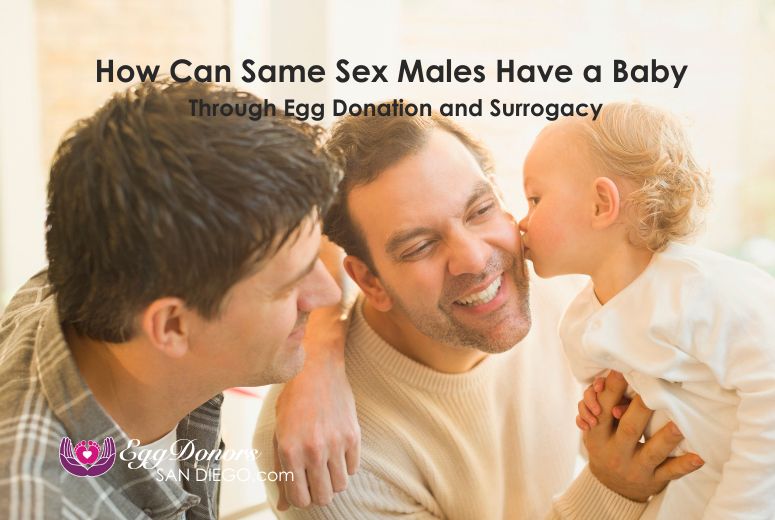Becoming a parent is a dream many gay men share—but the path is uniquely complex, often emotionally charged, and deeply rewarding. Thanks to advances in third-party reproduction, how gay men can have a baby through egg donation and surrogacy has evolved from a niche option to a well-established, hopeful reality. This process allows two dads to biologically connect with their child, often with one or both partners contributing sperm and a carefully chosen egg donor and surrogate bringing that embryo to life.
Dr. Minoos Hosseinzadeh, founder of EggDonorsSanDiego.com and Medical Director of the Fertility Institute of San Diego, explains:
“We’re seeing more same-sex male couples growing their families through egg donation and surrogacy than ever before. Our role is to personalize that journey with compassion, expertise, and results.”
How It Works
Step 1: Choose your clinic
Choose the doctor that you’d like to manage your journey to parenthood. Follow the doctor’s orders for preliminary medical testing and freezing your sperm samples. The sperm samples will be thawed later to create the embryos with your donor eggs.
Step 2: Selecting an Egg Donor for Gay Couples
Intended parents typically begin by choosing an egg donor for gay couples, often through an in-house donor program, like the one at Fertility Institute of San Diego, or an egg donor agency. EggDonorsSanDiego.com provides rigorous screening—medical, psychological, and genetic—to ensure healthy, high-quality donor matches. Donors remain anonymous or open, depending on the family’s preference.
Step 3: Embryo Creation
Using IVF technology, the chosen sperm fertilizes the donor eggs in a lab. Fertility clinics like ours guide couples through embryo creation with full transparency.
Step 4: The Gestational Surrogacy Process
In gestational surrogacy, the surrogate carries an embryo that has no genetic connection to her. This process is carefully monitored and legally supported to protect all parties. A fertility clinic for gay couples ensures the surrogate is physically, psychologically, and emotionally prepared.
Why This Option Is Popular for LGBTQ Family Building
- Biological connection: One or both partners can share a genetic link.
- Control over medical care: From egg selection to prenatal testing, parents remain involved.
- Inclusive support: Clinics now specialize in care tailored for two-dad families.
Dr. Hosseinzadeh adds:
“Many of our intended fathers are drawn to surrogacy because they want to be involved from the very beginning—ultrasounds, birth planning, even skin-to-skin bonding in the delivery room.”
Who Is Involved
- Intended parents (the future dads)
- Egg donor
- Gestational surrogate
- Fertility clinic
- Mental health professionals for psychological counseling
- Attorneys specializing in legal considerations for gay parents
When to Start
You can begin your parenting journey for gay dads once you’re emotionally, financially, and legally prepared. Many start consultations six to twelve months before they hope to begin IVF and surrogacy. The entire journey—donor selection, legal, IVF, pregnancy and delivery—can take 18–24 months.
Risk Factors and Emotional Challenges
Even with modern advances, not all IVF cycles result in pregnancy. The emotional impact of failed IVF can be profound. Grief, frustration, and financial strain are real. Access to post-IVF emotional support and psychological counseling after failed IVF is critical.
“We always remind our patients: a failed cycle isn’t the end of your story—it’s a chapter. Most families who persist, succeed,” says Dr. Hosseinzadeh.
Types of Treatment Available
- Fresh vs. Frozen Eggs
- Split Cycles (sperm from both partners)
- PGT Testing – Embryo testing before implantation
- Single embryo transfer to minimize risk
Legal Considerations for Gay Parents
Working with attorneys skilled in LGBTQ family building ensures your names are on the birth certificate and that both fathers’ rights are protected. California, where EggDonorsSanDiego.com is located, is one of the most surrogacy-friendly states in the U.S.
Prevention and Support
Proactive psychological care, well-defined contracts, and compassionate providers help reduce emotional and legal complications. Clinics should offer full-cycle support—including the post-IVF emotional support needed if there are setbacks.
Final Thoughts
Family isn’t defined by convention—it’s created through intention, love, and a team that knows how to guide you. If you’re exploring how gay men can have a baby through egg donation and surrogacy, take comfort in knowing there is a clear, proven, and personalized path.
“You deserve a family that reflects who you are—and we’re here to help you build it,” says Dr. Hosseinzadeh.
FAQ
Yes. it’s possible to inseminate 50% of the eggs with each partner’s sperm.
You’ll work with your fertility team and often an agency to find a healthy, emotionally prepared surrogate who aligns with your values and expectations.
This type of treatment has the highest chances of success. However, if failure happens, it’s common to feel loss. Clinics should offer counseling, next steps, and alternative strategies.
Yes, in most states including California, where the process is well-supported by law.
Usually between 18 to 24 months from the start of treatment to the birth of your baby.
If you’re ready to start your egg donation journey, click here.









